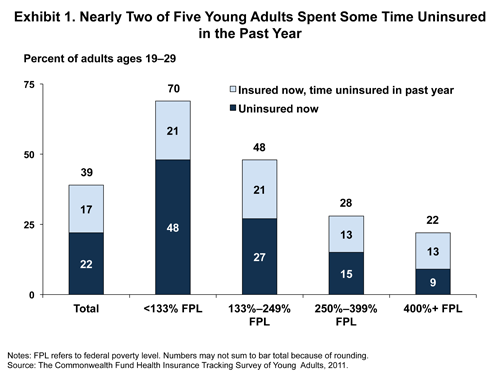
Young adults’ insurance coverage has significantly improved since the passage of the health law, but this trend could be derailed by the Supreme Court’s much-anticipated ruling on the law, expected this month.
One of the law’s most popular provisions requires insurers to cover people up to age 26 on their parents’ policies. Roughly 6.6 million 19- to 25-year-olds gained coverage they might not have had otherwise, according to a survey from the Commonwealth Fund, a health research group that supports the law. Overall, about 13.7 million stayed on or joined their parents’ health plans between November 2010 and November 2011.
The large number of enrollees shows that young adults are interested in health insurance as long as it is affordable, said Commonwealth Fund President Karen Davis.
“This shatters the myth of the ‘young invincible,” said Aaron Smith, executive director of Young Invincibles, a pro-health law group. Young adults are often called “young invincibles” because of the perception they do not often seek health care, or think they need it.
Part of young adults’ interest in coverage comes out of fear of medical debt. More than one third of those ages 19 to 29 reported problems paying their medical bills, according to the survey. Within this group, 43 percent said they had to use up all their savings, and 32 percent said medical debt led to problems with paying off other forms of debt, such as student loans.
With further insurance options in the health law pipeline for 2014, young adults “will likely enroll in large numbers,” said Commonwealth Fund Vice President Sara Collins. Only 6 percent of survey respondents who did not purchase insurance through their employer believed that they did not need it, while 24 percent said the coverage was too expensive; more than half said they had coverage through a partner or a parent.
Regardless of the outcome of the health law case at the Supreme Court, Davis said, lawmakers will need to aim for improved insurance coverage among young adults.
A government report released in November estimated that 2.5 million young adults gained insurance coverage between September 2010 — when the health law provision took effect — and June 2011. That survey based its estimate on a survey of insurance status. The Commonwealth Fund instead asked whether or not young adults had stayed on or joined a parent’s plan in the year prior, and then extrapolated based on demographic data.
The poll, conducted by Knowledge Networks for the Commonwealth Fund, surveyed 1,863 adults between November 4 and November 24, 2011 and has a margin of error of +/- 3 percent.






